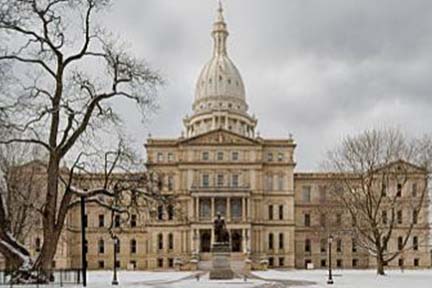
Funding to Help Build 708 Rental Homes Statewide

FOR IMMEDIATE RELEASE January 29, 2025 Contact: [email protected]
Gov. Whitmer Announces Funding to Help Build 708 Rental Homes Statewide Latest awards advance Statewide Housing Plan through 15 investments across 10 communities
LANSING, Mich. – Today, Governor Gretchen Whitmer announced significant new investments have been awarded to 15 new construction and rehabilitation rental housing projects in 10 communities to build 708 affordable rental homes across the state. The construction projects will create 85 permanent jobs, support 1,097 temporary jobs, and generate a total development investment of over $208 million.
“I am committed to growing access to affordable housing so every Michigander can raise their family in a vibrant community. We need more affordable places to call home in Michigan, and MSHDA is leading the way to get it done,” said Governor Whitmer. “These latest awards in communities across our state will create good-paying jobs, grow our economy, expand housing options, and make our state a better place to live. Our housing strategy is paying off, and we’ll keep working to help more families ‘make it’ in Michigan.”
“Our mission is grounded in the belief that every Michigander deserves a safe, affordable, and quality place to call home in a community of their choice,” said Tony Lentych, MSHDA Deputy Director and Chief Housing Investment Officer. “With 708 affordable rental homes on the horizon, these investments will not only provide much-needed housing but also create jobs and boost local economies. We’re proud to work alongside developers and communities to make a lasting impact and address housing needs across the state.”
This Low-Income Housing Tax Credit (LIHTC) program is awarding $17,332,458 in tax credits, with a total value over the next 10 years of about $173 million. LIHTCs are federal tax credits allocated by MSHDA following a competitive application process. Developers can claim credit against their tax liability annually for up to 10 years.
The following projects are receiving LIHTC awards:
725 Amsterdam, Detroit – Credit Awarded: $1,650,000
725 Amsterdam is being developed by a unique partnership between Henry Ford Health, Michigan State University along with Tom Gores and the Detroit Pistons. This development is being funded with a 9% tax credit award along with HUD 221(d)(4) funding and 45L Solar Tax Credits. The project is part of a wider neighborhood initiative and is projected to have a total development cost of $19,681,090 and is expected to create 40 new studio, one-, and two-bedroom affordable housing units targeted to households earning between 30% and 80% of the area median income (AMI). The development of 725 Amsterdam is projected to create one permanent and 50 temporary construction jobs.
Gesu Senior Housing, Detroit – Credit Awarded: $1,080,000
Gesu Senior Housing is a senior housing development being developed by MHT Housing, Inc. along with Gesu Parish Detroit. The project is being financed by a 9% tax credit award, HOME funds from the City of Detroit and a conventional mortgage from Cinnaire. The total development cost is projected to be $13,788,502 and will include the renovation and repurposing of the historic Gesu Parish Center building. The development is expected to create 36 one- and two-bedroom affordable units for senior households earning between 30% and 80% of the AMI. Eight of these units will be assisted by Project-Based Vouchers through the Detroit Housing Commission. The development is expected to create two permanent and 75 temporary construction jobs.
Orchardview Apartments, Traverse City – Credit Awarded: $1,360,500
Orchardview Apartments is an affordable housing development being developed by the Traverse City Housing Commission and Cove Investments, LLC. The project is being financed by a 9% tax credit award and a conventional mortgage from CPC Mortgage Company LLC. The project is expected to have a total development cost of $20,131,959 and will include a renovation of existing townhome units and the construction of new apartment units. Upon completion, the project will provide 54 one-, two-, three- and four-bedroom affordable housing units for households earning between 40% and 60% AMI. Twenty-one of these units will receive rental assistance through the Traverse City Housing Commission. The development is expected to create three permanent and 114 temporary construction jobs.
Villages of Parkside Phase III, Detroit – Credit Awarded: $1,565,000
Villages of Parkside Phase III is an affordable housing development being developed by Ginosko Development Company and Infinite Horizons Parkside Phase III LLC. The project is being financed by a 9% tax credit award and a loan from Citibank. The project is expected to have a total development cost of $21,658,658. The project will provide 54 one-, two-, three-, and four-bedroom units for households earning between 40% and 60% AMI. Twenty-five of these units will be assisted by Project-Based Vouchers through the Detroit Housing Commission. The development is expected to create 68 temporary construction jobs.
Rivercrest Apartments, Croswell – Credit Awarded: $320,500
Rivercrest Apartments is sponsored by PK Development Group and will rehabilitate 24 units of affordable housing. This development has 9% tax credits along with an existing Rural Development (RD) 515 mortgage and a new RD 538 mortgage. The project is expected to have a total development cost of $4,378,625 and will include the renovation of 24, one-, two-, and three-bedroom affordable housing units for individuals earning 60% of AMI. All 24 units carry rental assistance from the USDA RD. The project is expected to create four permanent jobs and 27 temporary jobs.
Flats on Bridge, Elk Rapids – Credit Awarded: $790,720
Flats on Bridge is sponsored by Ide Development LLC and HomeStretch Nonprofit Housing Corporation. This development is being funded with a 9% tax credit award along with a permanent loan through IFF and an Affordable Housing Program (AHP) award from the Federal Home Loan Bank of Indianapolis. The project is expected to have a total development cost of $8,055,331 and is expected to create 24 new, one- and two-bedroom affordable housing units for individuals earning between 30% and 80% of AMI. The development of Flats on Bridge is expected to create 18 permanent jobs and 17 temporary jobs.
Lincoln Avenue Lofts, Port Huron – Credit Awarded: $1,650,000
Lincoln Avenue Lofts is sponsored by Community Housing Network, Inc. and the Algonac Housing Commission. This development has 9% tax credits and a HUD 224(d)4 permanent loan, as well as a contribution from the general partner to support the on-site supportive services. It has a total development cost of $16,758,200. This development will have 24 one-bedroom units, and 16 two-bedroom units for households at or below 60% of area median income. This project intends to request 20 Project-Based Vouchers from MSHDA to support the permanent supportive housing units. An additional six units will benefit from project-based rental assistance from the Port Huron Housing Commission. The project will create 17 permanent jobs and 64 temporary jobs.
Shea Ravines II, Wyoming – Credit Awarded: $1,650,000
Shea Ravines II is sponsored by Woda Cooper Development, Inc. and Cherry Street Services, Inc. This development has 9% tax credits and a permanent loan from PNC Real Estate, 45L energy credits, as well as a contribution from the general partner to support the on-site supportive services. It has a total development cost of $17,824,982. This development will have 40 one-bedroom units, and 16 two-bedroom units for households ranging from 30%-80% of area median income. This project intends to request 20 Project-Based Vouchers from MSHDA to support the permanent supportive housing units. The project will create two permanent jobs and 62 temporary jobs.
LVD LIHTC I, Watersmeet – Credit Awarded: $1,493,227
LVD LIHTC I is sponsored by the Lac Vieux Desert Band of Lake Superior Chippewa Indians and RTHawk Housing Alliance. This development has 9% tax credits and a permanent loan from the Lac Vieux Desert Band. It has a total development cost of $13,439,857. This development will have 13 one-bedroom units, 20 two-bedroom units and 11 three-bedroom units for households at or below 60% of AMI. Twenty-two units will be covered by a Housing Assistance Payments contract from the Lac Vieux Desert Band. The project will create four permanent jobs and 228 temporary jobs.
Centennial Arms I, Evart – Credit Awarded: $1,277,808
Centennial Arms I is sponsored by Edison Community Partners LLC and the Evart Housing Commission. This development has 9% tax credits and a permanent loan from Cinnaire, energy credits, and a seller note. It has a total development cost of $18,957,210. This development will have eight one-bedroom units, 52 two-bedroom units, and 20 three-bedroom units for households ranging from 30%-80% of AMI. Fifty-six of these units will be assisted by Project-Based Vouchers through the Evart Housing Commission. The project will create 2.5 permanent jobs and 100 temporary jobs.
Centennial Arms II, Evart – Credit Awarded: $830,492
Centennial Arms II is sponsored by Edison Community Partners LLC and the Evart Housing Commission. This development has 9% tax credits and a permanent loan from Cinnaire, energy credits, a seller note, and a contribution from the general partner. It has a total development cost of $11,463,733. This development will have 53 one-bedroom units, eight two-bedroom units, and four three-bedroom units for households ranging from 30%-80% of AMI. Fifty-three of these units will be assisted by Project-Based Vouchers through the Evart Housing Commission. The project will create 2.5 permanent jobs and 100 temporary jobs.
Nelson School Apartments, Muskegon – Credit Awarded: $1,650,000
Nelson School Apartments is sponsored by General Capital Development LLC, Little River Real Estate Management LLC, and the Muskegon Housing Commission. This development has 9% tax credits and a permanent loan from Cedar Rapids Bank and Trust. It has a total development cost of $19,285,896. This development will have 38 one-bedroom units, and 14 two-bedroom units for households ranging from 30%-80% of AMI. Eight of these units will be assisted by Project-Based Vouchers through the Muskegon Housing Commission. The project will create 22 permanent jobs and 83 temporary jobs. |










